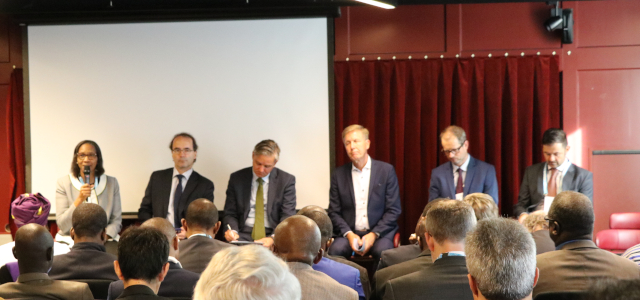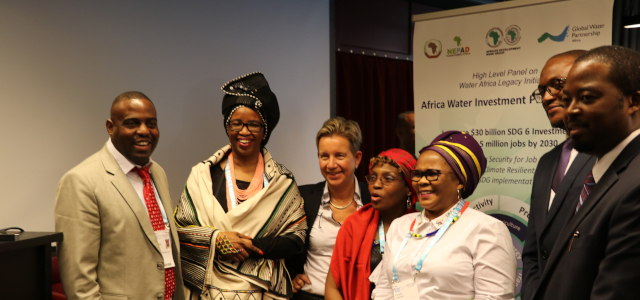The African Union Commission(AUC), the New Partnership for Africa's Development (NEPAD) Agency, the African Development Bank Group (AfDB), the African Water Facility (AWF), the African Ministers' Council on Water (AMCOW), and the Global Water Partnership (GWP) unveiled the Programme for Infrastructure Development in Africa (PIDA) Water project at the World Water Week in Stockholm, Sweden.
At a breakfast side event on “Accelerating project preparation and financing of transboundary water and hydropower projects in Africa: Learning from Africa and scaling up representatives of stakeholders and the organizing institutions for the PIDA Water Project (2019-2024) called upon AMCOW to support the partnership to prioritize and accelerated implementation of water infrastructure initiatives with the aim to contribute toward Africa’s development agenda.
The event was convened by African Union(AU), AfDB, AWF, NEPAD Planning Agency, AMCOW and GWP on the sidelines of the Stockholm World Water Week. The partners in a communique signed in Stockholm called for the nomination of an Africa Union Presidential Championship on Water to promote investment in the sector.
Speaking during official unveiling of PIDA Water, South Africa’s Deputy Minister of Water and Sanitation, Ms Pamela Tshwete, emphasized the need for good cooperation among countries, giving an example of how South Africa is cooperating with neighboring countries in the development of large water infrastructures – the Lesotho Highland Water infrastructure projects with Lesotho, Namibia and Botswana. She noted that this project has generated a lot of benefits for these countries including among other things provision of jobs for youth, women and other groups
Africa Development Bank’s Director of Water Development and Sanitation, Mrs Wambui Gichuri, highlighted the new initiative of the bank in advancing non-sovereign loans that can play a big role in water-related infrastructure development.
Mr. Hans Magnusson, Director, Department for Africa, Swedish International Development Cooperation Agency (SIDA) said that it was important to finding a connection of water financing and innovation, however, there are a few water projects for SIDA guarantees. He, however, noted that water projects are being explored and one such project is in Kenya. He revealed that corporate stewardship is another area which is being supported in some African countries (South Africa, Tanzania, Ethiopia etc.).
"It's important to find the best solutions on how to make the projects better. Some of the old projects especially dams on the Zambezi river need rehabilitation. There have to be policies in place in addition to the day to day running of the projects," he noted
Mr. Kay Parplies, Head of unit, Investment and Innovation Financing in the European Commission's Directorate-General for International Cooperation and Development (DG DEVCO), noted that the institution is starting to design guarantees and water is one of the areas they are considering, though at the moment water is not one of the key areas, it will be considered. He said that from 2021 there will be a new funding that can be considered for Africa Water Investment Programme (AIP)

The partners in a signed communique acknowledged the support expressed by partners and stakeholders to accelerate project preparation and financing of PIDA water priority transboundary projects and foster a water-food-energy-environment nexus approach in the development of hydropower projects through implementation of the PIDA Water Project 2019 – 2024.
They encouraged close cooperation with the AU Member States sponsoring the individual water and hydropower projects, as well as the active mobilisation and involvement of the private sector and the African Union’s technical, financial and implementing partners to transform and improve the investment outlook for water security and sustainable sanitation in Africa.
The partners took note of the vitality of water to nearly every aspect of ongoing efforts to implement the African Union Agenda 2063 and pursue rapid and sustainable pathways to build robust, competitive and climate resilient economies; accelerate employment; and deliver inclusive socio-economic development and livelihoods improvement.
They noted with appreciation the contributions of GWP, AUC, NEPAD Agency, AfDB, AWF, AMCOW and the partner organisations in formulating one of the HLPW Legacy Initiatives – the AIP – to respond to the three bottlenecks identified in the delivery of the water infrastructure needed to underpin economic growth and transformation in Africa, namely: i) the need for enhanced governance and investment guarantees for water management; ii) the need for country-led, integrated economic analysis of the role of water in the economy; and iii) the need for effective transaction management support.
